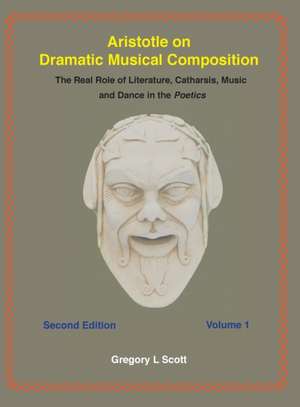Aristotle on Dramatic Musical Composition
Autor Gregory Scotten Limba Engleză Hardback – 10 oct 2018
| Toate formatele și edițiile | Preț | Express |
|---|---|---|
| Paperback (2) | 280.56 lei 3-5 săpt. | |
| Touchladybirdlucky Studios – 16 aug 2018 | 280.56 lei 3-5 săpt. | |
| Touchladybirdlucky Studios – 20 iul 2018 | 349.76 lei 3-5 săpt. | |
| Hardback (2) | 420.05 lei 6-8 săpt. | |
| ExistencePS – 10 oct 2018 | 420.05 lei 6-8 săpt. | |
| ExistencePS Press – 10 oct 2018 | 503.73 lei 6-8 săpt. |
Preț: 503.73 lei
Nou
Puncte Express: 756
Preț estimativ în valută:
96.40€ • 100.07$ • 80.38£
96.40€ • 100.07$ • 80.38£
Carte tipărită la comandă
Livrare economică 24 martie-07 aprilie
Preluare comenzi: 021 569.72.76
Specificații
ISBN-13: 9780999704936
ISBN-10: 0999704931
Pagini: 364
Dimensiuni: 221 x 286 x 24 mm
Greutate: 1.18 kg
Ediția:Edition 2
Editura: ExistencePS Press
ISBN-10: 0999704931
Pagini: 364
Dimensiuni: 221 x 286 x 24 mm
Greutate: 1.18 kg
Ediția:Edition 2
Editura: ExistencePS Press
Notă biografică
After working in the ballet field professionally, Gregory Scott finished his doctoral dissertation, Unearthing Aristotle's Dramatics: Why There is No Theory of Literature in the Poetics, under Francis Sparshott at the University of Toronto, while also studying there under one of the esteemed 20th century scholars of the Poetics, Daniel de Montmollin. Other mentors were Joseph Owens (Aristotle's Metaphysics) and Brad Inwood (Pre-Socratics). He then taught for four years as a full-time philosopher at universities in the U.S. and Canada. Afterward, he simultaneously engaged in a post-doctoral fellowship under Sarah (Waterlow) Broadie at Princeton University (Philosophy) while directing the doctoral program in dance education at New York University (NYU). Scott's publications include "The Poetics of Performance: The Necessity of Performance, Spectacle, Music, and Dance in Aristotelian Tragedy" (Cambridge University Press, 1999). His "Purging the Poetics" (Oxford Studies in Ancient Philosophy, 2003) has generated substantial debate on both sides of the Atlantic, with some internationally known specialists considering him on the basis of this article alone to have solved finally the problem of catharsis in Aristotle's definition of tragedy (the article is reprinted here as Chapter 5). He has also published on the philosophy of dance in journals such as Dance Research Journal, including "Twists and Turns: Modern Misconceptions of Peripatetic Dance Theory" (Dance Research, Edinburgh University Press, 2005). His Aristotle's Favorite Tragedy: Oedipus or Cresphontes? was published in 2016, and its 2nd edition appeared in February 2018.
Scott has taught occasionally since 1995 in Humanities at NYU (SPS) and is finishing a book entitled Aristotle's "Not to Fear" Proof for the Necessary Eternality of the Universe without the Unmoved Mover (anticipated publication 2019-20).
Scott has taught occasionally since 1995 in Humanities at NYU (SPS) and is finishing a book entitled Aristotle's "Not to Fear" Proof for the Necessary Eternality of the Universe without the Unmoved Mover (anticipated publication 2019-20).
